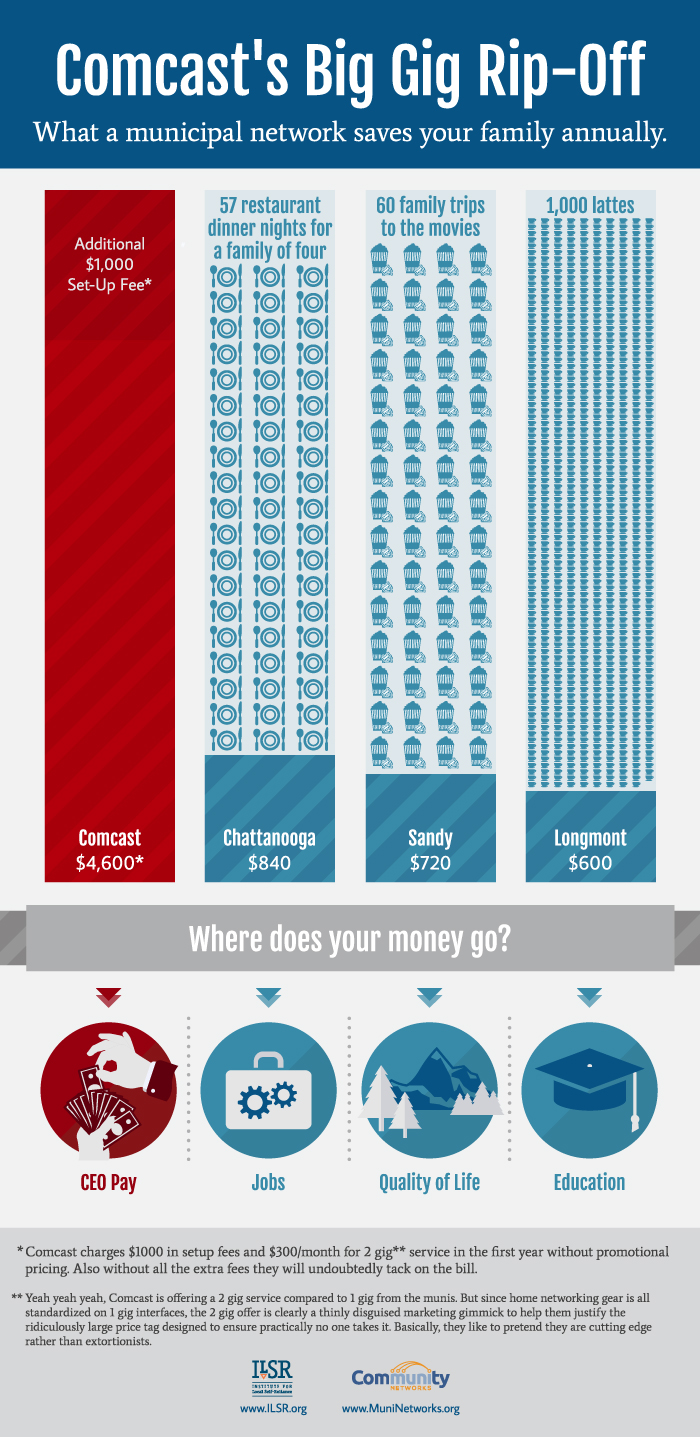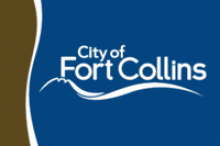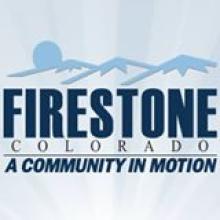Businesses in Fort Collins, Colorado, Advocate for Local Authority
“This is more important than widening I-25,” Lyons said. “This is not going to make much difference to me because I’m getting ready to retire. But it will make a difference for my kids and my grandchildren. The kinds of places they will work and what they do will depend upon it."
“The best service you can buy from the private sector, like to a residence in Fort Collins, is not as good as the crappiest service we deliver on the CSU campus,” Burns said. “It just cripples what can be done.”
New Municipal Broadband Feasibility Study Underway in Firestone, CO
The Board of Trustees for the city of Firestone, CO is evaluating the feasibility of a new municipal broadband service for this growing town of about 10,000 people that sits just 30 miles north of Denver. This according to a recent report in the Times-Call newspaper in Longmont, Colorado. The feasibility study will compare Firestone’s existing telecommunications infrastructure with those in nearby communities such as Longmont and Boulder that already have municipal networks. It will also assess the potential for growth of the service in Firestone to a nearby 3,500-home community development project.
It would be travesty to build a 3,500 home development without having a plan for high quality Internet access. Even if CenturyLink or Comcast were to deploy fiber optics there, the community should ensure there are plans for conduit or an open network to allow multiple service providers to provide a real choice.
A 2005 Colorado state law barring municipalities from providing internet service to their citizens has been an obstacle for Longmont and Boulder in their pursuit of their own city-run broadband services. Telecommunications companies in the Longmont area spent $200,000 on a campaign that helped defeat the referendum in 2009 and $400,000 more in 2011. But citizens in Longmont successfully voted in the 2011 referendum to exempt their town from the law and build their own community broadband network. As we wrote in May, Longmont’s NextLight fiber-based municipal broadband service, which started just 2 years ago, is now among the fastest internet services in the United States.
Who Has Citywide Gigabit Internet Access for $100 or Less?
As Westminster begins serving customers with its new FTTH network and partner Ting, we were curious how many communities are there where a residential subscriber can obtain affordable gigabit access? We estimate the number of networks, large or small, where a majority of residents in a community can obtain gigabit service for $100 or less to be 12. Westminster will be there in a few years.
Update: Russellville, Kentucky; Salisbury, North Carolina; and Wilson, North Carolina, also offer a gigabit, bringing the total number of citywide gigabit networks to 16. On September 1, we added another network that we previously overlooked - CSpire in Quitman and Flora, Mississippi (and soon others).
Municipal citywide, sub $100 gigabit providers:
- Leverett, Massachusetts
- North Kansas City, Missouri
- Chattanooga, Tennessee
- Tullahoma, Tennessee
- Sandy, Oregon
- UTOPIA Cities, Utah
- Russellville, Kentucky
- Salisbury, North Carolina (Fibrant)
- Wilson, North Carolina (Greenlight)
- Paul Bunyan Communications, Minnesota
- Farmer's Telecom, Alabama
- Co-Mo Connect, Missouri
- Google - Kansas City, Provo
- CSpire - Quitman and Flora, Mississippi
- MetroNet - Crawfordsville, Indiana (formerly a muni)
- Burlington, Vermont - (currently privately owned, formerly a muni with future in limbo)
We included municipal networks, cooperatives, and privately owned companies. When considering networks that cover multiple jurisdictions in a single area, we counted it as one (thus Google counts as 1 in KC, Chattanooga is 1 in TN). And we were looking for gigabit networks - not just gigabit download. While we prefer to see symmetrical connections, we accepted 500 Mbps up for our threshold.
Longmont Gig Finds Many Takers - Community Broadband Bits Episode 161

The community reaction to Longmont's NextLight gigabit municipal fiber network in Colorado has been dramatic. They are seeing major take rates in the initial neighborhoods, driven in part by the opportunity for a $50/month gigabit connection if you take service within three months of it becoming available in the neighborhood.
This week, Longmont Power & Communications General Manager Tom Roiniotis joins us to tell us more about their approach and how the community has responded, including a block party celebrating freedom from a well-known monopoly.
We discuss how they have connect the schools, the history of the network, and how incumbent providers are reacting. Along the way, I make a case for why what Longmont is doing is substantially different from the upgrades that CenturyLink and Comcast are making in some areas. See our other stories about Longmont here.
This show is 24 minutes long and can be played on this page or via Apple Podcasts or the tool of your choice using this feed.
Transcript below.
We want your feedback and suggestions for the show-please e-mail us or leave a comment below.
Listen to other episodes here or view all episodes in our index. See other podcasts from the Institute for Local Self-Reliance here.
Thanks to bkfm-b-side for the music, licensed using Creative Commons. The song is "Raise Your Hands."
Comcast's Big Gig Rip-Off
 For more information on the great offer from Sandy, see the video we just released about their approach.
For more information on the great offer from Sandy, see the video we just released about their approach.Longmont's NextLight Video: A Brief Look at the Network and the Community
When we talk to municipal network leaders about lessons learned, they often tell us that marketing is an area where they feel a particularly vulnerability. Whenever we see a great piece of marketing from a municipal network, we like to share it.
When Longmont rebranded its FTTH network under the name NextLight, they released this awesome video. Check it out!
Longmont's NextLight Offers Businesses, Residents Third Fastest Internet In the U.S.
Ookla finds the third fastest Internet access in the U.S. is located in Longmont, Colorado, reports the Times Call. NextLight, Longmont's gigabit municipal fiber network, is the source of the increase in speeds, driving Longmont's Internet access speeds far beyond any other service in the state.
Ookla clocks average download speed in Longmont as 105 Mbps, which includes all providers in the community. Incumbents Comcast and CenturyLink are dragging down NextLight's average download speed of 221 Mbps. Statewide, Colorado's average is 40 Mbps.
According to the article:
Ookla shows Internet speeds in Longmont shooting up in January and February, when LPC crews began hooking up customers to NextLight in earnest.
NextLight continues to attract residential and business customers. In February, NextLight announced it would be hiring more install crews to meet the high demand for connections. Places without the speed, affordability, and reliability NextLight can offer will find themselves at a disadvantage as economic development increasingly relies on next-generation networks.
The Times Call spoke with Bret McInnis, vice president for information technology for Circle Graphics. The local business switched from CenturyLink to NextLight because it needed better connectivity. Before taking service from NextLight, their maximum capacity connection was 50 Mbps download or upload and it wasn't enough:
Because the images for the canvases use high-resolution photos, they are sent in large files that can range from 100 to 300 megabits in size. The company prints anywhere from 5,000 to 20,000 canvases a day during the busy holiday season.
"We've got more bandwith," McInnis said, standing in front of the five tall black towers of computing equipment that make up the business's data center. "So the NextLight fiber feeds right into this and we used to see peaks with CenturyLink ... you would see periods when we were bursting at our capacity."
Switching to NextLight, McInnis said, means employees can download and upload the high-resolution images much more quickly.
Longmonters Loving NextLight in Colorado
Longmont's NextLight municipal broadband service is surpassing projected take rates, reports the Longmont Compass. The business plan called for 34 percent but as LPC builds out the FTTH network, the first phase of the project has achieved 45 percent.
In response to the positive response, LPC will speed up completion of the project. From the Compass:
“Our schedule was already aggressive, but we’ve heard repeatedly that our community is eager to receive high-quality, high-speed broadband,” LPC general manager Tom Roiniotis said. “So we’re accelerating the deployment.”
LPC now plans to “close the circle” from two directions at once as it completes its citywide buildout, rather than move around Longmont in one counterclockwise sweep. That means the final phase of the build is now scheduled to start in the first quarter of 2016 instead of the first quarter of 2017.
As we reported last fall, gigabit symmetrical service for $50 is available for customers who sign up within three months of service availability in their area. That rate follows customers who move within Longmont and transferable to to the next home owner.
Grand Junction Will Vote to Reclaim Municipal Telecommunications Authority
Grand Junction will join a number of other Colorado communities who asked voters for an exemption to SB 152 reports KKCO 11 News. Ballot measure 2A, asking voters to approve the city's right to provide Internet access and cable TV service will be decided in the April 7th election.
Measure 2A asks for a yes or no on the following question:
RESTORING AUTHORITY TO THE CITY TO PROVIDE EITHER DIRECTLY OR INDIRECTLY WITH PUBLIC OR PRIVATE SECTOR PARTNERSHIPS HIGH-SPEED INTERNET AND CABLE TELEVISION SERVICE SHALL THE CITY OF GRAND JUNCTION, WITHOUT INCREASING TAXES BY THIS MEASURE, BE AUTHORIZED TO PROVIDE, EITHER DIRECTLY OR INDIRECTLY WITH PUBLIC OR PRIVATE SECTOR PARTNER(S), HIGH-SPEED INTERNET SERVICES (ADVANCED SERVICE), TELECOMMUNICATIONS SERVICES AND/OR CABLE TELEVISION SERVICES AS DEFINED BY §§29-27-101 TO 304 OF THE COLORADO REVISED STATUTES, INCLUDING BUT NOT LIMITED TO ANY NEW AND IMPROVED HIGH BANDWIDTH SERVICE(S) BASED ON FUTURE TECHNOLOGIES, TO RESIDENTS, BUSINESSES, SCHOOLS, LIBRARIES, NONPROFIT ENTITIES AND OTHER USERS OF SUCH SERVICES, WITHOUT LIMITING ITS HOME RULE AUTHORITY?
Grand Junction, located on the western edge of the state, is home to approximately 147,000 people. Their interest in the SB 152 opt out generates from the need to be economically competitive with Longmont, Montrose, and the other Colorado towns that have already passed similar ballot measures.
The Daily Sentinel covered the region's broadband problems in a recent article:
“Broadband is not a selling point. It’s an expectation,” said Kelly Flenniken, director of the Grand Junction Economic Partnership. The group works on behalf of local entities to lure companies and increase business opportunities in the Grand Valley.
“It’s a modern day utility. It’s sort of like saying our roads are paved, too,” she said. “I really think from an economic development standpoint, it’s about maintaining a competitive position. If we’re trying to grow solo entrepreneurs, they’re going to want to live here. We want to make it so they can work here.”
International Media Covering NextLight Strides in Longmont
Longmont's NextLight is well known in the municipal networks space; now other media markets are starting to notice the most recent network in the Centennial State. CCTV America profiled the network recently, highlighting its importance to local businesses.
CCTV spoke with a local tech business owner who had recently connected to the municipal network:
Jon Rice is a web developer for whom a reliable computer connection is critical.
“Our entire business is basically predicated on having fast, easy access to the Internet,” Rice said.
Like many other modern households, Rice describes how their home hosts multiple devices. NextLight's $50 per month gigabit tier is a necessity for both his residential and business needs.
"It's a no brainer for us; the faster the better," says Rice in the video.
Demand is high in Longmont, where the community chose last fall to bond in order to speed up FTTH deployment. In a USAToday article from last November, Tom Roiniotis, Manager of Longmont Power and Communications, described how the utility was struggling to keep up with the requests for service:
"It's a good problem to have, scrambling to keep up with demand," Roiniotis said. "This is something we're doing locally and it's a big source of community pride. The money stays locally and if you have a problem you can just drive 2 or 3 miles down the road and come talk to us. People realize it's just as important ... as reliable energy and clean water."
Thanks to Jon Rice at the Longmont Compass who alerted us to this video and the story:






